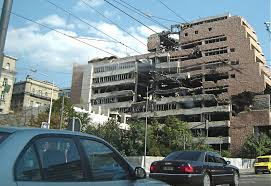When I was in Beijing during the protests in 1989, a middle-aged man came up to me and asked, “Couldn’t America send some B-52s here and…” and he made a swooping motion with his hand.
Ten years later, on May 7, 1999, the American bombers did show up.
Instead of showering freedom ordnance on China’s dictators, however, they dropped five bombs on the Chinese embassy in Belgrade.
As to why this happened, the United States has always declared it was an accident.
A lot of people in China believe otherwise and there is a good amount of evidence to support their view.
The bombing of the embassy was a wake-up call for the PRC leadership, which decided it urgently needed a doctrine and capabilities beyond its strategic nuclear deterrent to handle disagreements with the United States that might acquire a military dimension.
It was also a propaganda godsend for the regime.
Chinese demonstrators were back on the streets, but protesting against the United States instead of against the PRC regime’s deficiencies in Western democratic values.
Americans and the U.S. media had a hard time getting used to this unfavorable turn in some popular Chinese attitudes away from 1989 democracy-love, blaming the ill-feeling on the suppression of news of President Clinton’s apology.
In the July 2001 China Journal, Peter Hays Gries of Ohio State University analyzed letters and submissions to China’s Guangming Daily and characterized the protests as “genuine and understandable” and largely unrelated to unawareness of the presidential apology.
On the ten-year anniversary of the bombing, China Digital Times linked to an interview with a student who identified the bombing as the trigger for a sea-change in the worldview of at least some Chinese:

